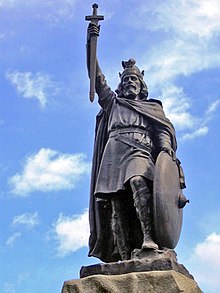Alfred the great
| Alfred the Great | |||||
|---|---|---|---|---|---|

Statue of Alfred the Great by Hamo Thornycroft in Winchester, unveiled during the millenary commemoration of Alfred's death.
|
|||||
| King of Wessex | |||||
| Reign | 23 April 871 – 26 October 899 | ||||
| Predecessor | Æthelred | ||||
| Successor | Edward the Elder | ||||
| Born | 849 Wantage, then in Berkshire, now Oxfordshire |
||||
| Died | 26 October 899 (around 50) Winchester | ||||
| Burial |
c. 1100 Hyde Abbey, Winchester, Hampshire, now lost |
||||
| Spouse | Ealhswith | ||||
| Issue |
Æthelflæd, Lady of the Mercians Edward, King of Wessex Æthelgifu, abbess of Shaftesbury Æthelweard of Wessex Ælfthryth, Countess of Flanders |
||||
|
|||||
| House | Wessex | ||||
| Father | Æthelwulf, King of Wessex | ||||
| Mother | Osburh | ||||
| Religion | Roman Catholic | ||||
| Full name | |
|---|---|
| Ælfred of Wessex |
Alfred the Great (Old English: Ælfrēd, Ælfrǣd, "elf counsel" or "wise elf"; 849 – 26 October 899) was King of Wessex from 871 to 899.
Alfred successfully defended his kingdom against the Viking attempt at conquest, and by the time of his death had become the dominant ruler in England. He is one of only two English monarchs to be given the epithet "the Great", the other being the Scandinavian Cnut the Great. He was also the first King of the West Saxons to style himself "King of the Anglo-Saxons". Details of Alfred's life are described in a work by the 10th-century Welsh scholar and bishop Asser.
Alfred had a reputation as a learned and merciful man of a gracious and level-headed nature who encouraged education, proposing that primary education be taught in English, and improved his kingdom's legal system, military structure and his people's quality of life. In 2002, Alfred was ranked number 14 in the BBC's poll of the 100 Greatest Britons.
Alfred was born in the village of Wanating, now Wantage, Oxfordshire. He was the youngest son of King Æthelwulf of Wessex by his first wife, Osburh.
In 853, at the age of four, Alfred is reported by the Anglo-Saxon Chronicle to have been sent to Rome, where he was confirmed by Pope Leo IV, who "anointed him as king".Victorian writers later interpreted this as an anticipatory coronation in preparation for his eventual succession to the throne of Wessex. This is unlikely; his succession could not have been foreseen at the time, as Alfred had three living elder brothers. A letter of Leo IV shows that Alfred was made a "consul"; a misinterpretation of this investiture, deliberate or accidental, could explain later confusion. It may also be based on Alfred's later having accompanied his father on a pilgrimage to Rome, where he spent some time at the court of Charles the Bald, King of the Franks, around 854–855.
...
Wikipedia
